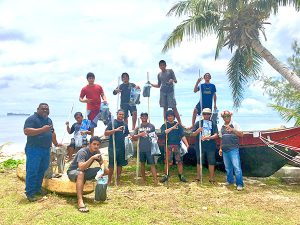Lawmaker donates traditional fishing gear

Iva Maurin
Participants of the Carolinian Affairs Office’s summer camp were the lucky recipients yesterday of 10 sets of fishing gear donated by Rep. Marco Peter (R-Saipan) to promote traditional fishing knowledge among the youth.
Each set was composed of a pair of boots, snorkel with a mask, and a triton Hawaiian sling or traditional spear.
“This is my gift to them,” said Peter at the turnover of his donation in Garapan.
He said the camp participants had the choice to just be stuck on their smartphones or just stay at home but he was impressed that “they’re taking the time to take two weeks to just go and stand the heat and get sunburned to learn how to fish.”
Peter said he is very proud of the participant, who are learning about the types and size of fish to catch, and how to respect coral reefs. Paraphrasing a quote from the Bible, Peter said: “You feed them a fish, they might choke on the bones. But if you teach them how to fish, they won’t starve. They are set. This is not just in fishing but in life. When they grow up, they will be more responsible. They will be able to fish for themselves.”
One of the participants, Amu Itibus, who is a sophomore at Marianas High School, said he joined the camp to learn the traditional ways of fishing. “I plan to use this type of fishing after the camp [and] pass it down to people who don’t know. I am thankful that [Peter] lent out a hand because…we’re short on equipment,” he said.
CAO executive director John Tagabuel said the camp is a way to touch base with teenagers and teach them the basics and importance of, and safety in fishing. Campers are taught how to identify fish, where to find them, when is the best time to go fishing, and even how easy it is to get into danger when in open water.
Tagabuel said that the Coastal Resource Management and CNMI Division of Fish and Wildlife taught the participants how to fish responsibly.
“Everybody is just…busy watching their phones…staying online…and not being with the environment like going out fishing or hunting. With the summer camp, we took away the technology part and made sure that they see the importance of why we do things the way we do. …We want to make sure that we pass on this traditional type of fishing to our next generation so that even they can pass it on to the next,” Tagabuel said.
The next activity is the lavalava-making, or traditional Carolinian dress making, set to be held in September, in celebration of Heritage Month.























